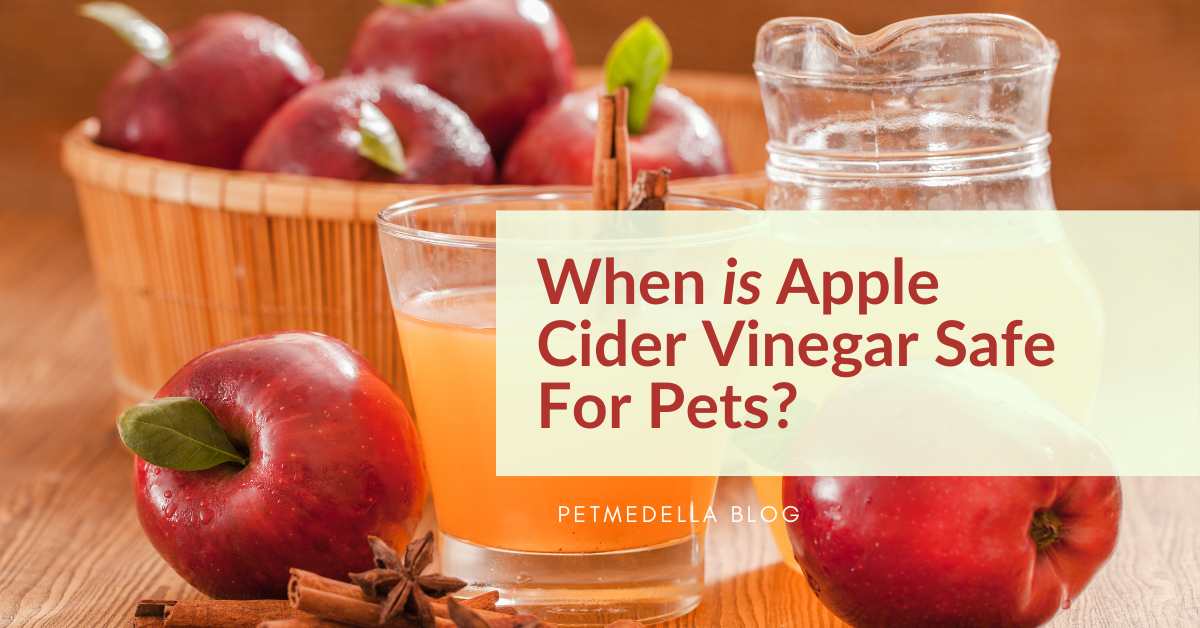
When is Apple Cider Vinegar Safe For Pets?
Petmedella and our employees are vigilant about creating balanced health for pets. We get inbox questions, and social media messages, asking questions like: When is apple cider vinegar safe for pets? Should you use it topically? Give it to them for drinking?
The buzz continues around apple cider vinegar, or ACV for short, and its use in pets.
In this article, we will explore:
- the potential benefits of apple cider vinegar for pets.
- debunk common myths.
- examine scientific research.
- discuss the risks and side effects for pets.
- and provide guidance on how to safely incorporate apple cider vinegar into your pet’s diet.
By the end, you’ll be equipped with the knowledge to make an informed decision to know : is apple cider vinegar is safe for pets?
Claims of Apple Cider Vinegar For Pets
Apple cider vinegar has been hailed for its numerous health benefits in humans, and proponents claim that these benefits extend to pets as well. It’s always important to approach any health claim with a critical mindset, and take your own pet into consideration.
Here are the common claims about apple cider vinegar.
- prevents urinary tract infections in pets
- help balance the pH levels in a pet’s body
- ability to promote a healthy Digestive System
- antibacterial and anti-fungal properties
- improve skin conditions, or the Integumentary System
- flea/parasite treatment or prevention
Let’s unpack these claims! Is apple cider vinegar safe for pets?

Is Apple Cider Vinegar Safe for Pets with Urinary Infections?
Urinary tract infections can be seen in both dogs and cats. Underlying health conditions, and the internal environment can play a role. Urinary infections can occur, commonly with E. coli invading the Urogenital System, and infections can be recurrent.
We always recommend that you visit a licensed veterinary care practitioner if you suspect a urinary issue with your cat or dog. Excessive urination, straining, odour, blood, excessive licking, and blood in urine need examination (1)
However, there is limited scientific evidence to support this claim. While apple cider vinegar may have some antimicrobial properties, it is unlikely to be a reliable solution for preventing or treating urinary tract infections. Furthermore, signs of urinary infections may not be obvious, and they can extend into kidneys, altering function. Renal issues affect nutrition, and accumulation of protein (2). Apple cider vinegar may not help this.
Is Apple Cider Vinegar Safe for Pets and helping pH Balance?
Another claim is that apple cider vinegar can help balance the pH levels in a pet’s body, which can promote overall health. While it is true that apple cider vinegar is acidic, with a pH of 2-3, there is considerable debate whether or not ACV changes the pH in the body, of a human, or a pet.
The pH of a pet’s body is tightly regulated by various systems, and while for many pet’s there is no harm in giving small amounts of diluted ACV, in some pets with health conditions, this can be harmful.
Let’s look at urolithiasis, which happens in dogs and cats. This is a condition where crystals form in the lower urinary tract or bladder. There are many risk factors for this including limited hydration. Breed can also play a role in these broad conditions. You may have heard of struvite or calcium oxalate crystals. These can differ between dogs and cats.
Among the risk factors are urine acidifying properties of food. In a cat or dog with a kidney health issue, the addition of ACV may increase the acidity of urine and complicate conditions. Something to keep in mind when thinking about adding in this liquid.
Is Apple Cider Vinegar Safe for Pets to Promote Healthy Digestion?
One of the main claims of apple cider vinegar in humans, is its ability to promote a healthy Digestive System. Apple cider vinegar is believed to improve digestion by increasing the production of digestive enzymes, which can aid in the breakdown of food and absorption of nutrients.
This can be the case for some dogs, however it should never be give undiluted. The acidic nature of the vinegar can irritate, and even burn sensitive mucosa, which lines the mouth, esophagus, stomach and all through the digestive tract. Some pets have sensitive stomachs and this may irritate the issue further.
At the end of the day, if your pet is healthy, and you decide to try a little ACV for digestion, start really small, and give diluted, with food. If your cat or dog refuses to eat it, take it as a sign that it might upset their digestion, and they don’t like it. Pets are intuitive, and there are lots of digestive enzymes on the market.
Is apple cider vinegar safe for pets with fungal issues?
Additionally, apple cider vinegar is thought to have antibacterial and anti-fungal properties, which may help combat common infections that pets can be prone to. We specifically think about fungal infections when it comes to the skin, or the Integumentary System. This is an interesting concept, as ACV contains its own set of bacteria (1).
Bacteria makes vinegar, and these bacteria include Acetobacter, Gluconacetobacter, Gluconobacter and Komagataeibacter. These bacteria have a high capacity to oxidize ethanol to acetic acid. They also have a high resistance to acetic acid that is released into the fermentative food. (1)
There is some potential benefit of apple cider vinegar on the skin and coat. This is currently one of our top concerns from pet parents, as skin issues seem to be rising in pets, especially dogs. We frequently see the Integumentary and Digestive Systems stressed on on our Full Scans.
Is Apple Cider Vinegar Safe for Pets with skin conditions, or stress in the Integumentary System?
Many pet owners claim that regular use of apple cider vinegar has improved the condition of their pet’s skin, reducing itchiness and dryness. There is validity in your own experience! Much advice exists on the internet to apply apple cider vinegar with a cotton ball or q tip to your pets skin, where “hot spots” are concerned. While the vinegar does contain antibacterial properties, it is also acidic, and can burn skin. See what it feels like by applying ACV on an open wound of your own.
Use your judgement, and dilute vinegar. If there is a lot of broken skin, consider omitting or use a small amount in a multi ingredient preparation. Try a minimum 50:50 dilution as bath water for a dog or cat with ITCHINESS.
ACV can also be drying, and get into your pets eyes. Apple cider vinegar, diluted, can also be used around, not in, your dogs ears for cleaning.
Is Apple Cider Vinegar safe for pets as flea/parasite treatment or prevention
Some internet spaces claim that this is a myth. What do you think? Have you found that you have had success, meaning less flea or tick issues using solutions containing ACV? Come find us on Instagram and let us know!
Apple cider vinegar, along with certain essential oils, may have some repellent properties. Dr. Judy Morgan has some great information on natural flea and tick prevention, and is known for her natural and judicious approach to things like heartworm, and parasites like fleas.
The same advice applies, when using ACV for flea prevention, and this is diluted! Make sure to wash bedding often, keep your lawn mowed, and vacuum, vacuum. vacuum. Use a flea comb on your cat, who may detest the bath.
Debunking Common Myths about Apple Cider Vinegar for Pets
There are several myths surrounding the use of apple cider vinegar for pets that need to be debunked.
- One common myth is that apple cider vinegar can cure or prevent cancer in pets.
While apple cider vinegar may have some health benefits, it is not a miracle cure for cancer. Cancer is a complex disease that initially requires proper veterinary care and possible treatment. Many holistic modalities can be blended with allopathic or conventional approaches to illness like cancer. Relying solely on apple cider vinegar for cancer prevention or treatment can be dangerous and ineffective. - Another myth is that it will be a cure all for dental issues. Just like lemon juice, apple cider vinegar can erode delicate tooth enamel. Our Practitioner Tanya Stricek, is a Holistic Nutritionist and retired Dental Hygienist, and she points out that dental erosion can happen in pets, just as well as people. Pets also can have dry mouth due to medications, stress, or low level dehydration, which amplifies the acidity of apple cider vinegar. If you are relying on apple cider vinegar, as a beverage, or to “clean” teeth just know that you may be risking your pet’s tooth enamel, and just like you, they can feel tooth sensitivity, and pain in the mouth. We know that many pets do not like a toothbrush in their mouths, especially if they aren’t used to it. Hard toothbrushes can hurt the gums, and you may have felt that yourself! ACV may add to the pain.
Consider using an enzymatic or probiotic pet friendly toothpaste, with a soft cloth, for starters.
Is There Scientific Research on the Question, “Is Apple Cider Vinegar Safe for Pets”
When it comes to evaluating the effectiveness of any natural remedy, it is important to look at scientific research. Unfortunately, there is a lack of studies on the effects of apple cider vinegar and many health products for pets!
A lot of available research focuses on its effects in humans.
While some of the benefits seen in humans may translate to pets, it is important to remember that animals have different physiologies and metabolisms. Therefore, research is needed to determine the true effects of apple cider vinegar or any supplement on pet health.
That being said, there are a few small studies that have shown promising results. For example, a study conducted on dogs found that apple cider vinegar can help lower blood glucose levels in diabetic dogs. However, it is important to note that these studies are limited in scope and more research is needed to confirm these findings.
We always suggest to proceed slowly, with any new supplement or food added to your pet’s routine. Monitor for changes in skin, behavior, digestion, urination and eating, and emotional patterns.
The Takeaways on: Is Apple Cider Vinegar Safe for Pets
It is also important to choose a high-quality, organic apple cider vinegar that does not contain any additives or preservatives. Always dilute the apple cider vinegar with water before administering it to your pet, and gradually introduce it into their diet to allow their digestive system to adjust.
Be careful of eyes and ears when bathing or applying dilute solutions to see if they work for fleas or skin issues.
While apple cider vinegar may have some potential benefits, it is not the only natural remedy available for promoting your pet’s health. There are many other natural options that you can explore, such as probiotics, omega-3 fatty acids, and other herbal supplements.
The use of natural products like apple cider vinegar for pets, will always be a topic of debate.
Like many holistic and conventional product, there will be potential benefits, and potential downsides. Ultimately, the decision to incorporate apple cider vinegar into your pet’s diet should be based on careful consideration, taking the uniqueness of your beloved pet in mind. Remember that there are many different natural remedies available, that may address your pet’s skin and digestion, and sometimes it takes trial and error in finding the right fit.
Rotation of products, using singly and then combined, and keeping a watchful eye, or even tracking, subtle changes can help you find the right plan for your pet. PetMedella can come alongside with testing for remedies!
